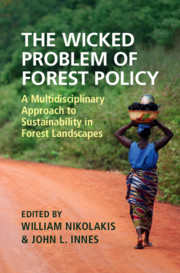 The Wicked Problem of Forest Policy
The Wicked Problem of Forest Policy from Part II - Tools to Address Wicked Problems
Published online by Cambridge University Press: 24 July 2020
The Kehicap (Symposiachrus boanensis) or Black-chinned monarch is a bird species whose entire world population of 100–200 individuals survives in a few tiny patches of forest on the remote Indonesian Island of Buano in the Moluccas. The main threat to the Kehicap is fuelwood gathering by a relatively small population of local people. The habitat of the Kehicap is a protected forest (Hutan Lindung), and local people are violating the law when they harvest fuelwood. The future of the Kehicap is a classic example of a wicked problem. There is a direct conflict between measures to protect the species and the livelihoods of local people. There are huge and irreconcilable differences in their understanding of what the problem is – or even of whether there is a problem. Policies to counter forest loss and degradation have fallen short in achieving these goals. Devolution of forest management to local communities offers promise but also challenges. Wicked problems cannot all be solved one at a time – they will cease to exist when mature and effective institutions emerge to regulate the activities of a prosperous and well-educated population.
To save this book to your Kindle, first ensure no-reply@cambridge.org is added to your Approved Personal Document E-mail List under your Personal Document Settings on the Manage Your Content and Devices page of your Amazon account. Then enter the ‘name’ part of your Kindle email address below. Find out more about saving to your Kindle.
Note you can select to save to either the @free.kindle.com or @kindle.com variations. ‘@free.kindle.com’ emails are free but can only be saved to your device when it is connected to wi-fi. ‘@kindle.com’ emails can be delivered even when you are not connected to wi-fi, but note that service fees apply.
Find out more about the Kindle Personal Document Service.
To save content items to your account, please confirm that you agree to abide by our usage policies. If this is the first time you use this feature, you will be asked to authorise Cambridge Core to connect with your account. Find out more about saving content to Dropbox.
To save content items to your account, please confirm that you agree to abide by our usage policies. If this is the first time you use this feature, you will be asked to authorise Cambridge Core to connect with your account. Find out more about saving content to Google Drive.